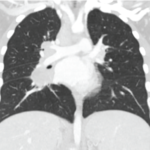It’s May, and soon, most state legislatures will be adjourning for the remainder of the year. Joseph Cantrell, JD, senior manager of state affairs for the ACR, who tracks the progress of state and federal patient care legislation, reports that several states saw solid gains during 2018 state sessions, which typically run from January to…
The ACR/CHEST ILD Guidelines in Practice, a video
In collaboration with the American College of Chest Physicians, the ACR released two new comprehensive guidelines aimed at improving the screening, monitoring, and treatment of patients with interstitial lung disease (ILD) secondary to systemic autoimmune rheumatic diseases (SARDs). Recently, Sindhu R. Johnson, MD, PhD, professor of medicine at the University of Toronto, Canada, director of the Toronto Scleroderma Program and principal investigator for the guideline, and Elana J. Bernstein, MD, MSc, Florence Irving associate professor of medicine in the Division of Rheumatology at Columbia University, New York City, and co-first author, presented a webinar to talk about how the guidelines were developed and present some of the recommendations and their rationale: Watch the recording now!
Joint Efforts: RheumPAC Facilitates Progress
Advocacy and RheumPAC staff from the ACR and other medical specialty organizations gathered in Nashville this month to discuss the importance of making sure your members know the details of the work advocacy and the PAC are doing. Thus far, the ACR has had a very successful year in terms of its advocacy efforts. Following…
Research Shows High Adherence to Performance Measures for RA Cohort
New research examines the adherence rates for system-level performance measures in Canada. Using data from the Canadian Early Arthritis Cohort that spanned eight years, researchers determined the percentage of RA patients seen in yearly follow-up with the number of gaps between visits, the percentage of RA patients treated with a disease-modifying anti-rheumatic drug and number days from diagnosis to the initiation of treatment. The results: High adherence to system-level performance measures was found in this early RA cohort, with small declines in performance with the increasing length overtime…

ACR/ARHP Members Call on Congress to Restore Patients’ Voices
WASHINGTON, D.C.—The ACR hosted the 2018 Advocacy Leadership Conference in Washington, D.C., on May 16–17. Rheumatology professionals from around the country flew to our nation’s capitol to attend the conference, where advocates heard from key policymakers and spoke with lawmakers about the issues that affect the rheumatology community—and what ACR/ARHP members can do to influence policy….
Affiliate Society Council Meeting Provides Motivation, Fellowship, Opportunity
On Wednesday, May 16, 2018, the ACR’s Affiliate Society Council (ASC) convened a meeting in Washington, D.C., in conjunction with the ACR’s Advocacy Leadership Conference. Despite inclement weather that delayed or cancelled numerous flights, several rheumatology representatives from states across the U.S. attended the meeting in person, while others participated by conference call. “It was…

Ethics Forum: Righting the Wrong Diagnosis
A 54-year-old woman is establishing care in your clinic after retirement of her previous rheumatologist. Your review of her records suggests that she was diagnosed with systemic lupus erythematosus seven years ago on the basis of symptoms of body pain and fatigue, and serologic evidence of positive ANA 1:40 (speckled) and borderline anti-SSB antibody. She…

Rheumatology Can Use MACRA to Drive Healthcare Improvements
We have entered the second year of the Medicare Access and CHIP (Children’s Health Insurance Program) Reauthorization Act (MACRA) of 2015. It’s no secret that the costs of medical care—17.1% of the U.S. gross national product compared with 9.8% in Great Britain, 10.7% in Canada and 11.6% in France—have become an overwhelming driver for change….

ACR Praises Congress for Bill with Part B Fix, Therapy Caps Repeal
The ACR praises Congressional leaders for passing the sweeping spending agreement, which includes a technical provision reversing a Centers for Medicare & Medicaid Services (CMS) policy that would have linked physicians’ quality payment adjustments to Medicare Part B drug costs starting in 2019. The ACR also applauds the inclusion of provisions that permanently repeal Medicare…

Funding Available for Community Practitioners from the Rheumatology Research Foundation
Few opportunities exist for rheumatologists in community-based practice who, in addition to taking care of patients, want to test their own observations through research. Limited funding, time constraints and competition from larger academic medical centers are some of the barriers hindering clinical research in this setting. The Rheumatology Research Foundation is addressing this issue with…

Gut Microbiota Directly Affects Inflammatory Arthritis
Gut microbiota may provide insight into important environmental triggers for autoimmune diseases. New research in mice indicates that intestinal dysbiosis triggers a mucosal immune response that stimulates T and B cells, which are critical to the development of inflammatory arthritis…
- « Previous Page
- 1
- …
- 123
- 124
- 125
- 126
- 127
- …
- 307
- Next Page »
